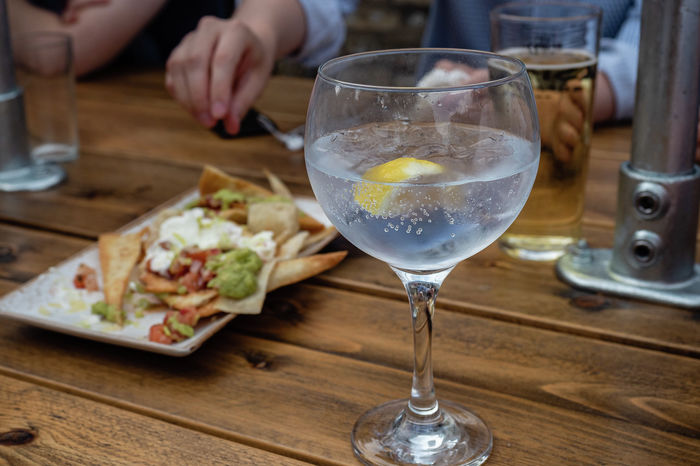The death of the casual pint
As more young people turn to sobriety, Claire Gao investigates the reasons behind the phenomenon and how this impacts students’ social lives at Cambridge

Meekly nursing a Diet Coke at subject drinks at the beginning of term, my college child asked me, “is this what third year is like, no drinking and no fun?”
I’ve gone teetotal for my last year of university, not because of any serious commitment to work or health, but just because alcohol makes me feel a bit sick. Many of those around me are similarly reducing their drinking, fostering a culture where one can opt out of a casual pint without needing much of an explanation. My own Director of Studies commented on the younger generations’ temperance, spinning stories about his own perpetually drunk philosophy supervisors back in his day.
“My social life has been exactly the same – I am a big clubber, I love it, and I’ve still gone to every event I would have done before quitting”
Dubbed the ’sober curious’ generation, Gen Z do seem to be drinking less alcohol. Even for the UK youth, amongst whom drinking culture is notoriously abundant, the NHS Health Survey for England found in 2021 that ‘those aged between 16 to 24 were least likely to drink once a week (31%)’, compared to 59% of their parents’ generation. This pattern has carried across to university drinking culture, to the point where some members of College ‘drinking societies’ at Cambridge don’t even actually need to drink.
I spoke to other Cambridge students who are either sober or have reduced their drinking, with experiences ranging from having never drunk much at all, to having gone through a period of particularly heavy drinking and then deciding to stop.
Arlo, who has “never drunk”, cites simply not liking the taste as one reason for his sobriety. On top of that, he doesn’t see the appeal of the effects. “I hate the idea of getting drunk or even tipsy. I’d just rather not deal with the stresses of managing alcohol and staying safe.” Although, he has no judgement against those who do drink: “I can totally see why people do. It’s a good social lubricant and can help you feel more relaxed and have a fun night.”
“Plus, it saves me a lot of money!”
James, on the other hand, had not drunk much before university, but in first year “started drinking a lot, like most freshers do. It just seemed to be what everyone was doing.” The pattern of getting caught up in the “Michaelmas drinking scene” repeated the year after, but speaking about his third year, he comments, “I was conscious I had a lot of work to do as a finalist”. Beginning with “one or two sober nights out” and not drinking at every social event, “I quickly realised that I enjoyed being sober at events way more than I enjoyed being drunk.”
Amy was in a similar boat to James. Because “a lot of the socialising involves drinking and clubbing” as a fresher at a college with a big ents scene, she greatly increased her drinking when first coming to uni and enjoyed it. James now faces the same ‘fresher pressure’ as a postgrad: “I’m technically a fresher again, and while that hasn’t brought any explicit pressure to drink, most of your opportunities to make friends are drinking-related so I have been drinking again. It was the same in my undergrad – I don’t know how I would have met my friends without pub crawls or club nights.”
“Perhaps it’s Cambridge’s condensed terms and productivity culture where waking up ‘with no hangover, ready to work’ […] is a particular benefit”
Students also cite health benefits from being sober. From my own experience, I’ve felt less lethargic on nights out and can stay out for much longer. James also noticed an increased “physical and social stamina” to go to more events with more energy – “if anything, my social life has gotten better”. Arlo similarly appreciates the health benefits of staying sober. “Plus, it saves me a lot of money!”
The lack of hangover after a night out is also a huge bonus. Perhaps it’s Cambridge’s condensed terms and productivity culture where waking up “with no hangover, ready to work” in James’ case is a particular benefit, but he notes that even in the moment, “if I drank on a night out, I regretted it the next day because I knew how much better it would have been sober.”
Health was a major factor in deciding to drink less for Amy, both physical and mental. “One reason I reduced drinking was physical health, [like] feeling sick and getting sick.” Further, whilst struggling with her mental health, alcohol would worsen symptoms – “alcohol is a depressant”. Whilst she hasn’t completely stopped drinking, the types of events where drinking is common have also just become less appealing to her: “I just haven’t been going to as many social activities where drinking would take place, because of being busy or just being too tired.”
“People at Cambridge have been very supportive”
A big takeaway from those I spoke to was that being sober either positively impacted or did not impact social life at all. Fuelled by sugar and caffeine alone, Arlo feels that being sober has “paradoxically” made him “more confident because I still go clubbing, but have to fight my inhibitions unaided.” He has “thankfully never felt much pressure to drink. People at Cambridge have been very supportive.” On clubbing or going to social events sober, James notes that he “felt so much more present and in-the-moment because when you’re drunk you might have a good time but you’re not conscious of how much fun you’re having, and when you’re sober you can have fun and be aware you’re having fun which makes it ten times better.” He also describes a kind of osmosis of the drunk energy from those around him.
However, drinking culture is still pervasive at university. Whilst, according to James, “nobody says anything if I don’t drink on a night out”, at something big like a May Ball or a college ent, “it becomes sacrilege” to be sober. “People will say things like ’well you can’t go to a may ball and not drink.’” Though being sober certainly wouldn’t be a cause for ridicule, “you obviously get prying questions but that’s only understandable, given how ubiquitous drinking is in British society”, Arlo says. “I don’t like that it’s so ingrained in British and university culture and tied to every leisure activity.” Interestingly, James has noticed that pressure from other people has eased the more he “brand[s]” himself explicitly as a non-drinker. “People just go along with it. It’s almost like an identity thing.”
“Though being sober certainly wouldn’t be a cause for ridicule, ‘you obviously get prying questions but that’s only understandable, given how ubiquitous drinking is in British society’, Arlo says”
On the pressure to drink, Amy reveals that being sober is “generally accepted”, and that she doesn’t really feel the stereotypical mantra of “you’re not cool if you don’t drink”. Although she concedes that it does hugely depend on your social circles – “having friends who don’t drink as much is helpful because it makes you feel like you’re not the only one”. The only pressure seems to come from within, feeling “left out” when seeing “everyone else drinking and having a good time.”
The advice that James offers is this: “My social life has been exactly the same - I am a big clubber, I love it, and I’ve still gone to every event I would have done before quitting. I think it’s really a myth that you have to change your lifestyle when you go sober; I’ve always hated when people say things like “I’m drinking because you have to be drunk to enjoy revs” – by all means drink at events, but if it isn’t fun sober, then just don’t go because drinking should enhance fun, not create it.”
Apart from having to explain that I wasn’t on the verge of an essay crisis nor undergoing a health cleanse, it has made no difference to my social life. I think that much of that has to do with the reduced stigma and gravitas of being sober – as more and more people choose not to drink, the less that sobriety is seen as an odd thing that you have to explain away. Cheers to ordering a lemonade at the pub crawl.
All names have been changed.
 Interviews / You don’t need to peak at Cambridge, says Robin Harding31 December 2025
Interviews / You don’t need to peak at Cambridge, says Robin Harding31 December 2025 News / Cambridge academics stand out in King’s 2026 Honours List2 January 2026
News / Cambridge academics stand out in King’s 2026 Honours List2 January 2026 Comment / What happened to men at Cambridge?31 December 2025
Comment / What happened to men at Cambridge?31 December 2025 News / Unions protest handling of redundancies at Epidemiology Unit30 December 2025
News / Unions protest handling of redundancies at Epidemiology Unit30 December 2025 News / Varsity’s biggest stories of 202531 December 2025
News / Varsity’s biggest stories of 202531 December 2025









